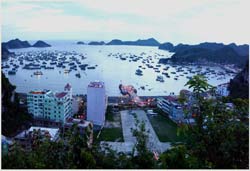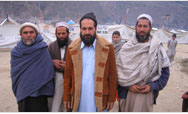You are here » Home » Telling Our Story
Case Study
Resorts and residents benefit from sustainable tourism practices
Eco-Tourism Reaps Benefits

| |
Photo: Flora and Fauna International
|
|
Cat Ba Island, once a sleepy fishing village, is now a resort town.
"I learned a lot about community-based tourism and especially about how to do cultural performances and home stays. [The project] also helped me make contacts with tour operators," said Nguyen Thi Thuy Lanh, chair of the Viet Hai tourism association.
|
Challenge
Vietnam is in the midst of a tourism boom that is bringing much needed economic growth to coastal
communities, but creating challenges in ecologically sensitive areas of the country. On Cat Ba Island,
a UNESCO Biosphere Reserve in picturesque Ha Long Bay, tourism development has depleted fresh water
supplies while wastewater pollution in the harbor has noticeably increased. Cat Ba town, once a sleepy
fishing village, is now a major resort town sporting more than 100 multi-story hotels, with many more
under construction. As a result, local inhabitants have begun to suffer from many of the negative
social and environmental impacts of tourism growth, such as increasing prostitution, drug addiction
and pollution.
Initiative
USAID is supporting efforts to introduce environmentally friendly tourism practices on Cat Ba Island
that provide economic benefits to the local population, not just city-based tourism companies. A pilot
project is raising awareness of eco-tourism opportunities to demonstrate that sustainable tourism
practices can provide higher-yield, lower-impact benefits. Activities have included training hotels
in eco-certification standards for energy and water use, building the capacity of a local hotel
association, promoting traditional architecture and performances to attract eco-tourists, and
developing a community-based cooperative in Viet Hai, a village in Cat Ba National Park. Residents
involved in tourism development have visited other areas of Vietnam and Thailand to learn best
practices in developing tourism that helps the poor.
Results
Hotel owners in Cat Ba have begun to realize the benefits of eco-certification standards, from
reduced water and electricity use to new marketing opportunities. In addition, the Vietnam National
Tourism Administration recently revised the draft Law on Tourism to include sections that specifically
promote eco-certification. In Viet Hai, villagers and leaders have come to understand that lower-impact,
community-based tourism is more beneficial when the revenue generated goes to residents. The success
of the program is serving as a model for alternative, more sustainable development in Cat Ba Island.
Print-friendly version of this page (40kb - PDF)
Click here for high-res photo
Back to Top ^ | 

